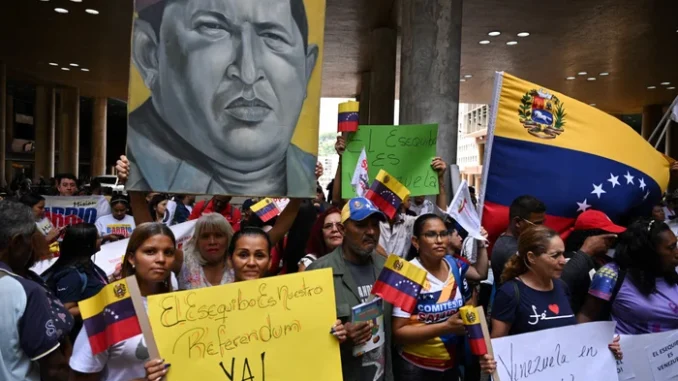

ANALYSIS:
The territorial dispute between Guyana and Venezuela over the Essequibo region—a 160,000-square-kilometer area comprising over two-thirds of Guyana—has intensified, leading Guyana to seek intervention from the International Court of Justice (ICJ). This longstanding conflict, rooted in an 1899 arbitration award that Venezuela has since contested, has seen renewed tensions due to recent geopolitical developments.
Historical Context
The origins of the dispute trace back to the 19th century when the 1899 arbitration award delineated the boundary between Venezuela and what was then British Guiana. Venezuela has consistently deemed this award null and void, asserting claims over the Essequibo region. The discovery of substantial oil and gas reserves off Guyana’s coast in 2015 heightened the strategic importance of the area, further complicating the territorial disagreement.
Recent Escalations
In recent months, the dispute has escalated markedly. On March 1, 2025, Guyana’s President Irfaan Ali reported that a Venezuelan coast guard vessel entered Guyanese waters, approaching an oil block operated by ExxonMobil. This incursion was perceived as a direct threat to Guyana’s territorial integrity and economic interests, prompting Guyana to summon the Venezuelan ambassador and plan a formal complaint to the ICJ.
Further exacerbating tensions, Venezuela announced plans to conduct elections in the contested Essequibo region, including the election of a governor to administer the area. Guyana’s foreign ministry condemned this move as a violation of international law and a breach of a December 2022 agreement aimed at preventing conflict over the resource-rich territory. In response, Guyana is seeking provisional measures from the ICJ to halt Venezuela’s actions.
International Response
The international community has expressed concern over the escalating situation. The United States and the Organization of American States have condemned Venezuela’s actions, urging respect for international law and cautioning against destabilizing maneuvers in the region. The U.S. administration has specifically warned Venezuela of potential consequences for further provocations, emphasizing support for Guyana’s sovereignty.
Legal Proceedings at the ICJ
The ICJ has been engaged in the dispute since Guyana filed a case in 2018, seeking affirmation of the 1899 arbitration award’s validity. Venezuela initially contested the court’s jurisdiction but, in December 2020, the ICJ ruled that it had the authority to adjudicate the matter. Subsequently, in April 2023, the court rejected Venezuela’s preliminary objections, allowing the case to proceed to the merits phase.
Guyana’s recent appeal to the ICJ aims to secure provisional measures to prevent Venezuela from proceeding with the planned elections in the Essequibo region. Guyana argues that such actions could irreparably harm its rights and escalate tensions further. The ICJ’s decisions on these provisional measures are pending, and a final resolution on the territorial dispute could take several years.
Conclusion
The Guyana-Venezuela border dispute over the Essequibo region remains a complex and sensitive issue with significant geopolitical and economic implications. Guyana’s recourse to the ICJ underscores its commitment to resolving the conflict through legal and diplomatic channels. The international community’s role in supporting a peaceful resolution is crucial to prevent further escalation and ensure stability in the region.
Leave a Reply